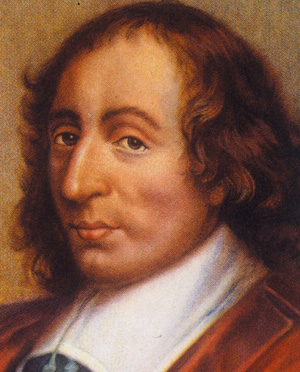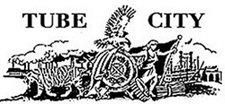
Blaise Pascal (June 19, 1623 - August 19, 1662) was a French mathematician, physicist, inventor, writer and Christian philosopher. He was a child prodigy who was educated by his father, a tax collector in Rouen. Pascal's earliest work was in the natural and applied sciences where he made important contributions to the study of fluids, and clarified the concepts of pressure and vacuum by generalizing the work of Evangelista Torricelli. Pascal also wrote in defense of the scientific method. (Click here for full Wikipedia article)
-----
A mere trifle consoles us, for a mere trifle distresses us.
All the troubles of man come from his not knowing how to sit still.
Do you wish people to believe good of you? Don't speak.
Either God exists or He doesn't. Either I believe in God or I don't. Of the four possibilities, only one is to my disadvantage. To avoid that possibility, I believe in God.
Evil is easy, and has infinite forms.
Experience makes us see an enormous difference between piety and goodness.
Force rules the world- not opinion; but it is opinion that makes us use force.
How useless is painting, which attracts admiration by the resemblance of things, the originals of which we do not admire!
I made this letter very long, because I did not have the lesiure to make it shorter.
If all men knew what others say of them, there would not be four friends in the world.
It is incomprehensible that God should exist, and it is incomprehensible that He should not exist.
It is man's natural sickness to believe that he possesses the Truth.
Justice without force is powerless; force without justice is tyrannical.
Little things console us, because little things afflict us.
Man governs himself more by capriciousness than reason.
Man is so made that if he is told often enough that he is a fool he believes it.
Men never do evil so completely and cheerfully as when they do it from religious conviction.
Our nature consists in motion; complete rest is death.
People almost invariably arrive at their beliefs not on the basis of proof but on the basis of what they find attractive.
Silence is the greatest persecution; never do the saints keep themselves silent.
Since we cannot be universal and know all that is to be known of everything, we ought to know a little about everything.
The charm of fame is so great, that we like every object to which it is attached, even death.
The eternal silence of these infinite spaces fills me with dread.
The last thing one knows in constructing a work is what to put first.
The sole purpose of man's unhappiness is that he does not know how to stay quietly in his room.
There are people who lie simply for the sake of lying.
Thinking makes man great.
Time heals griefs and quarrels, for we change and are no longer the same persons.
We must learn our limits. We are all something, but none of us are everything.
We shall die alone.
What a chimera then is man! What a novelty! What a monster, what a chaos, what a contradiction, what a prodigy! Judge of all things, feeble earthworm, depository of truth, a sink of uncertainty and error, the glory and the shame of the universe.
When we are accustomed to use bad reasons for proving natural effects, we are not willing to receive good reasons when they are discovered.
When we read too fast or too slowly, we understand nothing.
-----
(Today is also the birthday of Elbert Hubbard and Pauline Kael.)
Categories: Blaise Pascal, Quotes of the day
![]() Subscribe
[Home]
[Commentwear]
[E-Mail KGB]
Subscribe
[Home]
[Commentwear]
[E-Mail KGB]
Older entries, Archives and Categories Top of page
















